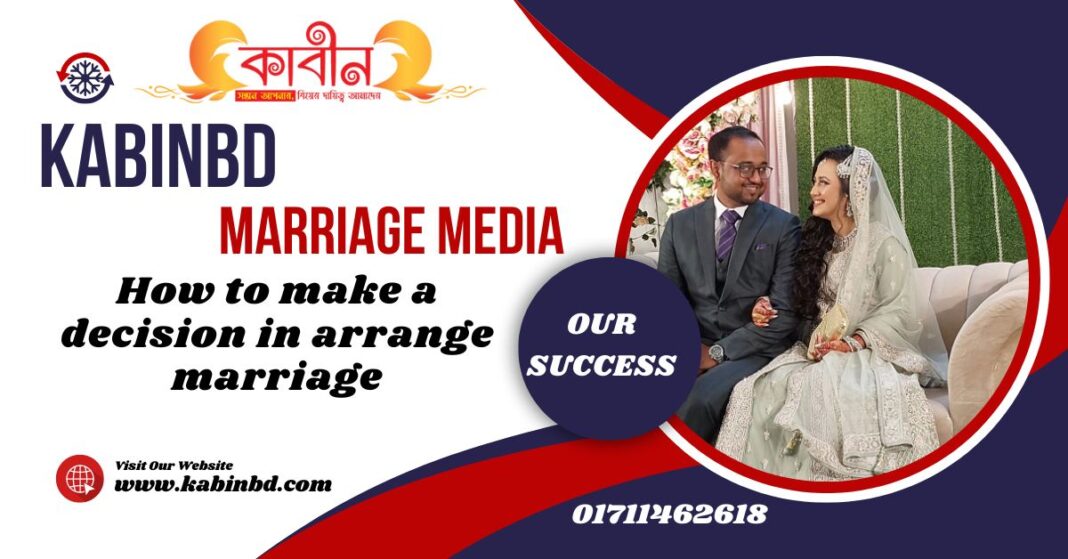How to make a decision in arrange marriage
Navigating the Waters of Arranged Marriage: A Guide to Decision-Making
Arranged marriages have been a cornerstone of many cultures for centuries, particularly in regions like South Asia, the Middle East, and parts of Africa. Despite modern changes in societal norms, arranged marriages remain a prevalent practice in many communities. Making a decision in an arranged marriage is not just about choosing a life partner; it involves balancing personal preferences, family expectations, cultural values, and practical considerations. This process can be overwhelming, so it is important to approach it systematically and thoughtfully. This guide will explore various aspects of decision-making in an arranged marriage, including self-reflection, communication, cultural understanding, family dynamics, and the role of intuition. Arranged marriages, while a cultural tradition in many societies, can present unique challenges when it comes to decision-making. The process often involves a blend of family expectations, societal pressures, and personal aspirations. This guide aims to provide insights into making informed choices in the context of arranged marriages.
-
Self-Reflection: Understanding Your Needs and Values
Before you even begin to meet potential partners, it’s crucial to understand yourself—your values, goals, and what you want from a marriage. Self-reflection is the first step in making a decision that aligns with your long-term happiness.
- Identify Your Core Values: What are the principles that guide your life? These could include religious beliefs, cultural practices, career aspirations, or the importance of family. Understanding these will help you determine if a potential partner shares similar values, which is key for long-term compatibility.
- Personal Goals and Aspirations: Think about where you see yourself in the next five, ten, or twenty years. Do you want to pursue a certain career? Are you interested in traveling? How do you see your role in a family? These questions will help you understand if the person you’re considering as a partner will support and align with your aspirations.
- Non-Negotiables: Everyone has deal-breakers, and it’s important to be honest with yourself about what they are. These might include attitudes towards children, religious practices, or lifestyle choices. Being clear about these from the outset can prevent future conflicts.
-
Family Dynamics and Expectations
In an arranged marriage, family plays a significant role, often more so than in a love marriage. Understanding family dynamics and expectations is essential to making a decision that respects both your desires and those of your family.
- Understand Your Family’s Expectations: Families involved in arranged marriages typically have expectations about the kind of person they want for you. This could include factors like education, family background, religion, caste, or economic status. Discussing these expectations with your family can help you understand where they stand and how much flexibility they are willing to allow.
- Communicate Your Own Expectations: While understanding your family’s desires is important, it’s equally crucial to communicate your own. Let your family know what you’re looking for in a partner. This could prevent misunderstandings and ensure that your preferences are considered in the decision-making process.
- Balancing Tradition and Modernity: Many people find themselves caught between respecting traditional values and embracing modern views on marriage. It’s important to strike a balance that you are comfortable with. This might involve negotiating with your family about certain aspects of the marriage process, such as the level of involvement they have or the criteria for selecting a partner.
-
Evaluating Compatibility
Once potential matches are identified, the next step is to evaluate compatibility. This goes beyond surface-level attributes and delves into deeper aspects that will affect your marriage in the long run.
- Cultural and Religious Compatibility: In many arranged marriages, cultural and religious compatibility is a priority. This includes shared beliefs, traditions, and practices. A shared cultural or religious background can provide a strong foundation for a relationship, but it’s also important to consider how strictly both families adhere to these practices and whether there is room for compromise.
- Lifestyle and Interests: Assessing compatibility in terms of lifestyle is crucial. This includes how you both like to spend your free time, your approach to health and fitness, social habits, and interests. While you don’t need to share every hobby, having some common ground can help strengthen your bond.
- Emotional and Intellectual Compatibility: Emotional intelligence and intellectual compatibility are often overlooked but are key to a successful marriage. This involves being able to communicate effectively, resolve conflicts, and support each other’s emotional needs. It also includes having meaningful conversations, sharing similar viewpoints on important matters, and respecting each other’s opinions.
- Financial Compatibility: Money is a common source of tension in marriages, so it’s important to discuss financial expectations early on. This includes understanding each other’s spending habits, savings goals, and financial responsibilities. Transparency about finances can prevent conflicts down the road.
-
Communication: The Foundation of a Strong Relationship

Effective communication is crucial in any marriage, but it’s especially important in an arranged marriage where the partners may not know each other well beforehand. Building open, honest, and respectful communication can lay a strong foundation for your relationship.
- Initial Conversations: The first few conversations with a potential partner are crucial for setting the tone of the relationship. Use this time to ask open-ended questions that help you understand each other’s personality, values, and life goals. Topics can include family, career aspirations, views on marriage, and expectations from a partner.
- Discussing Expectations: Clearly discussing what you expect from marriage, and from each other, is vital. This includes roles within the household, career ambitions, family planning, and how to handle conflicts. Understanding each other’s expectations can help you gauge whether you’re on the same page.
- Handling Differences: It’s natural to have differences, but how you handle them is what matters. Talk about how you plan to manage disagreements and compromise. This is also the time to discuss any potential deal-breakers and how you might navigate them.
- Family Involvement: Given that arranged marriages often involve both families, it’s important to discuss how much involvement each of you expects from your families after marriage. This includes living arrangements, family visits, and how to handle family expectations.
-
The Role of Intuition
While logical reasoning and practical considerations are essential, intuition also plays a key role in making a decision in an arranged marriage. Sometimes, despite everything seeming perfect on paper, something might feel off, or conversely, you might feel an inexplicable connection with someone.
- Listening to Your Gut: If something doesn’t feel right, it’s important to pay attention to that feeling. This could be a sign that, despite all the positive attributes, there might be an underlying issue that you haven’t identified yet. It’s worth exploring these feelings further before making a decision.
- Assessing Comfort Levels: During your interactions with a potential partner, assess how comfortable you feel around them. Can you be yourself? Do you feel respected and heard? A strong partnership often begins with mutual comfort and ease.
- Evaluating Emotional Reactions: Take note of how you feel after spending time with the person. Do you feel happy, excited, and looking forward to seeing them again? Or do you feel anxious, stressed, or doubtful? Your emotional reactions can be a strong indicator of your true feelings.
-
The Role of Family in Decision-Making
In an arranged marriage, family plays a significant role not only in introducing potential partners but also in guiding the decision-making process. Understanding the role of family and how to navigate their involvement can help you make a more informed decision.
- Family as Advisors: Many people see their family as advisors in the marriage decision-making process. Your family knows you well and often has your best interests at heart. However, it’s important to remember that the final decision should ultimately be yours, as you are the one who will be living with the consequences.
- Involving the Family at the Right Stage: It’s crucial to involve your family at the right stage of the process. This could mean seeking their opinion after you’ve had initial conversations with a potential partner or before making a final decision. Timing can affect how much influence they have on your decision.
- Managing Family Pressure: In some cases, family pressure can be overwhelming. It’s important to stand your ground and ensure that your voice is heard. If you feel pressured to make a decision, take a step back and assess whether you’re comfortable with the choice. It’s better to take your time than to rush into a decision because of external pressures.
-
The Importance of Time
Rushing into a decision, especially in an arranged marriage, can lead to regret. It’s important to give yourself ample time to make a thoughtful decision.
- Don’t Rush the Process: Marriage is a lifelong commitment, so it’s important to take your time when making a decision. Rushing can lead to overlooking important red flags or missing out on deeper compatibility issues.
- Set a Realistic Timeline: While it’s important not to rush, it’s also helpful to set a timeline for making a decision. This can prevent the process from dragging on indefinitely and help both parties know where they stand.
- Evaluate Over Multiple Meetings: Don’t make a decision based on just one or two meetings. Take the time to meet the person in different settings, and ideally, have conversations about various aspects of life and marriage. This will give you a more comprehensive understanding of the person.
-
Seeking External Guidance
Sometimes, it’s helpful to seek external guidance when making such an important decision. This could be in the form of advice from friends, counseling, or reading up on successful marriage practices.
- Talking to Married Friends: If you have friends or relatives who are in successful arranged marriages, talking to them can provide valuable insights. They can share their experiences, challenges, and how they made their decision.
- Premarital Counseling: Premarital counseling can be a great way to prepare for marriage. It helps couples explore important topics like communication, finances, and conflict resolution. This can also be a good way to assess compatibility in a structured environment.
- Educational Resources: There are many books, articles, and online resources available that provide advice on making marriage decisions. Reading up on these can provide you with additional perspectives and tips on how to approach the process.
-
Making the Final Decision
After considering all the factors, it’s time to make the final decision. This can be daunting, but with careful consideration, you can make a choice that is best for you.
- Weighing Pros and Cons: Make a list of the pros and cons of marrying the person. Consider all the aspects discussed above—values, compatibility, family involvement, etc. This can help clarify your thoughts and make the decision-making process more structured.
- Discussing with Trusted Individuals: Sometimes, discussing your thoughts with a trusted friend, mentor, or family member can help. They can provide an outside perspective and might raise points you hadn’t considered.
- Trusting Your Instincts: Ultimately, you need to trust your instincts. If everything checks out logically but you still have doubts, it’s worth considering why that might be. Conversely, if you feel a strong positive connection, that’s also worth noting.
- Making a Confident Decision: Once you’ve weighed all the factors and listened to your instincts, make your decision confidently. Whether it’s a yes or a no, being confident in your choice will help you move forward with peace of mind.
Making a decision in an arranged marriage is a complex process that involves introspection, communication, and careful consideration of various factors. By taking the time to understand your own needs and values, evaluating compatibility, communicating effectively, and involving your family in a balanced way, you can make a decision that aligns with your long-term happiness. Trusting your intuition and seeking external guidance when needed can further support you in making a confident and informed choice. Remember, marriage is a significant commitment, and taking the time to make the right decision is crucial for a fulfilling and successful partnership.
Understanding Your Values and Goals
Before delving into the process, it’s crucial to identify your personal values and goals. Consider questions such as:
- What are your priorities in a relationship? Are they companionship, love, shared values, or something else?
- What are your career aspirations and life goals?
How do you envision your future, and how might a partner fit into that vision?
- What are your deal-breakers in a relationship? Are there certain qualities or behaviors that you cannot tolerate?
By understanding your own desires and needs, you can better evaluate potential partners and make decisions that align with your long-term happiness.
Communicating Openly with Your Family
Family plays a significant role in arranged marriages. Open and honest communication with your family members is essential to ensure everyone’s expectations are aligned. Discuss your concerns, questions, and desires with your parents or guardians. Their guidance and support can be invaluable throughout the process.
Getting to Know Your Potential Partner
Arrange multiple meetings with your potential partner to get to know them better. Engage in conversations about their interests, hobbies, values, and goals. Pay attention to how you feel around them. Do you feel comfortable, respected, and understood?
Considering Family Dynamics
Family dynamics can significantly impact a marriage. Consider the following:
- Compatibility with In-Laws: How do you feel about your potential partner’s family? Are they accepting, supportive, and respectful?
- Family Values and Traditions: Do your family values and traditions align with those of your potential partner’s family?
- Family Expectations: Are there any family expectations or pressures that could affect your relationship?
Evaluating Compatibility
Compatibility is essential for a successful marriage. Consider the following factors:
- Shared Values and Beliefs: Do you share similar values, beliefs, and life goals?
- Intellectual Compatibility: Are you intellectually compatible? Can you have stimulating conversations and enjoy each other’s company?
- Emotional Compatibility: Are you emotionally compatible? Can you support and understand each other’s feelings?
- Lifestyle Compatibility: Are your lifestyles compatible? Do you have similar interests, hobbies, and social habits?
Trusting Your Gut[td_smart_list_end]
While logic and reason play a vital role in decision-making, sometimes your intuition can provide valuable insights. Trust your gut feelings and pay attention to any red flags or warning signs.
Seeking Professional Guidance
If you’re feeling overwhelmed or unsure about your decision, consider seeking professional guidance from a therapist or counselor. They can provide a neutral perspective and help you navigate the complexities of arranged marriage.
Remember, You Have the Power to Choose
Ultimately, the decision of whether or not to proceed with an arranged marriage is yours to make. Don’t feel pressured to conform to societal expectations or family pressures if they don’t align with your own happiness and well-being.
Remember, choosing a life partner is a significant decision that will impact the rest of your life. Take the time to carefully consider all factors and make a choice that aligns with your values and goals.
Best Bangladeshi Matrimonial Service
আপনি যদি বিয়ের ব্যাপারে সিরিয়াস হয়ে থাকেন তবে
লিংকে ক্লিক করে ফ্রী রেজিষ্ট্রেশন করুন
অথবা বিস্তারিত জানতেঃ
Gmail:kabinbd4@gmail.com
01711462618 এ কল করুন ২৪/৭ সার্ভিস
























